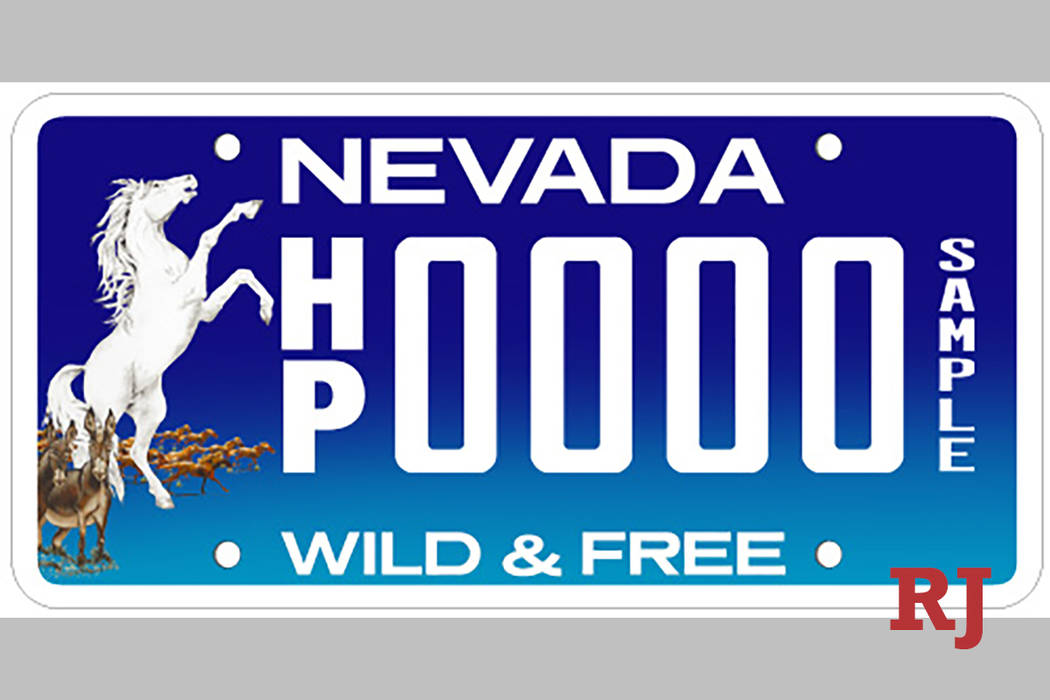Audit leads to Nevada nonprofit losing funding from specialty license plate
A charitable organization that rescues abused and injured wild horses has lost its source of state funding for a second time, prompting Nevada lawmakers to propose a bill aimed at addressing such cases.
Horse Power, a Northern Nevada-based nonprofit, is funded almost entirely with money generated by its specialty license plate, according to the Nevada Department of Motor Vehicles.
In fiscal 2018, there were 7,570 active Horse Power plates, generating $169,108 for the organization. Since the plate’s approval in 2006, it has generated $1.3 million as of fiscal 2018. The money was generated by a $30 per plate initial registration fee and a $20 per plate fee for annual renewals.
But the DMV halted funding and production of the Horse Power specialty plate effective Dec. 31 after an audit by the Special License Plate Commission questioned the nonprofit’s spending habits.
Horse Power’s funding was also suspended in 2012 after another legislative audit found the organization had fabricated its books to show revenue and expenditures were in balance. The 2012 report also noted unverified spending at retail and restaurant locations.
The two suspensions are the only times any action has been taken against an organization behind a specialty plate, according to DMV spokesman Kevin Malone.
In response to the Horse Power problem, the Assembly Committee on Growth and Infrastructure introduced Assembly Bill 484, which would create a blueprint for addressing charitable organizations that receive money through sales of Nevada specialty license plates and are found to be not in compliance with the stipulations that govern the plates.
The corrective measures would range from the suspension of fund dispersal and plate production to the discontinuance of the plate and the revenue.
AB484 was approved by the Assembly on April 17 and unanimously passed by the Senate Growth and Infrastructure Committee on Thursday.
“I think the overall concept is fantastic; it’s a great way to fund different groups, but I’d hate to see something like this happen again,” said former state Sen. Patricia Farley, who chaired the license plate commission in 2018. “It’s public money, and whatever the Legislature approves, we have to be accountable for that.”
Audit’s findings
The audit of Horse Power’s expenditures in the 2015 and 2016 fiscal years cited multiple issues:
■ The group failed to provide ownership records for the horses it has on its Northern Nevada facilities despite multiple requests.
■ It did not justify $130,000 of debit card activities in the organization’s bank account designated as operating expenses.
■ The executive director, Sally Summers, did not document the use of a private vehicle for business purposes and a sharp decrease of grant awards to other organizations.
Summers disputed the report, telling the Las Vegas Review-Journal she did provide proper documents for the spending in question. She also said she had to move from Washoe Valley into a more rural area because of harassment she received after the report was released.
“I was accused of taking vacations, which is funny. That is hysterical,” Summers said. “I drive a vehicle that is from 2003, and it looks like an old ranch truck. No new vehicles, nobody is getting any face-lifts around here. There has been no illegal spending, there’s been nothing illegal, immoral or unethical.”
“Maybe fattening once in a while, I do like Cheesecake Factory. But seriously, we live almost like pioneers.”
Incomplete documents
Farley said the documents provided by Summers were incomplete.
“She didn’t provide all the documents,” Farley said. “What she did provide were inaccurate, and there were holes in them. There were a lot of receipts that couldn’t be verified to how they pertained to the charity.”
Farley said the documents showed a significant amount of money going into Summers’ salary.
“If you look at the overall percentage at how much of the money went toward salary and how much went to the actual animals and the care and keeping of them, I want to say it was greater than 60 percent was being spent on her bills and it wasn’t going to where it was intended to go,” Farley said.
Also, between 2009 and 2015, grant expenditures to other organizations dropped around 90 percent, from $56,303 in 2009 to $4,825 in 2015, the audit report said.
“Part of her charter was to also dole out some of that money to other groups that help the horse,” Farley said. “There was no process for that. Any money given to anybody else, was very minor, if at all.”
But Summers insists Horse Power did provide groups with funds.
“We supplied them with everything they needed,” she said. “We have the report, it’s close to 300 pages, with documents and documents and documents. Everything was supplied.”
The audit report said that Horse Power had 40 horses under its care and that money had been redirected to pay for operation costs to run a rescue facility operated by Summers. The report also said the horses weren’t being fostered at an acceptable rate, which caused a large portion of money to go toward feed for the animals.
“It is questionable if Horse Power is meeting its original intent of establishing a philanthropic program to financially aid others who care for equine and was approved by the Commission on Special License Plates in 2006,” the report said.
Recommended changes
The 2017 audit provided 15 recommended changes Horse Power could carry out before Aug. 3, 2017, to keep its funding, including detailing all compensation and spending by Summers.
That deadline was extended twice, once in September 2017 and then again in January 2018 to March 15, 2018. Between August and October 2017, Summers was replaced as executive director by Phil Johncock, at the request of the commission, with Summers still being a large part of the organization.
After the decision to cut the funding off for the plate, Summers said Horse Power had to let Johncock go as the organization contemplates its future.
“We’re in restructuring mode,” she said.
Summers said Horse Power had fulfilled all the Special License Plate Commission’s requests when its funding was halted.
As it stands, Summers hasn’t given up hope on getting the Horse Power license plate reinstated, but she declined to comment on what the organization’s next move will be.
“There are some possibilities and we’re exploring all of them,” she said.























